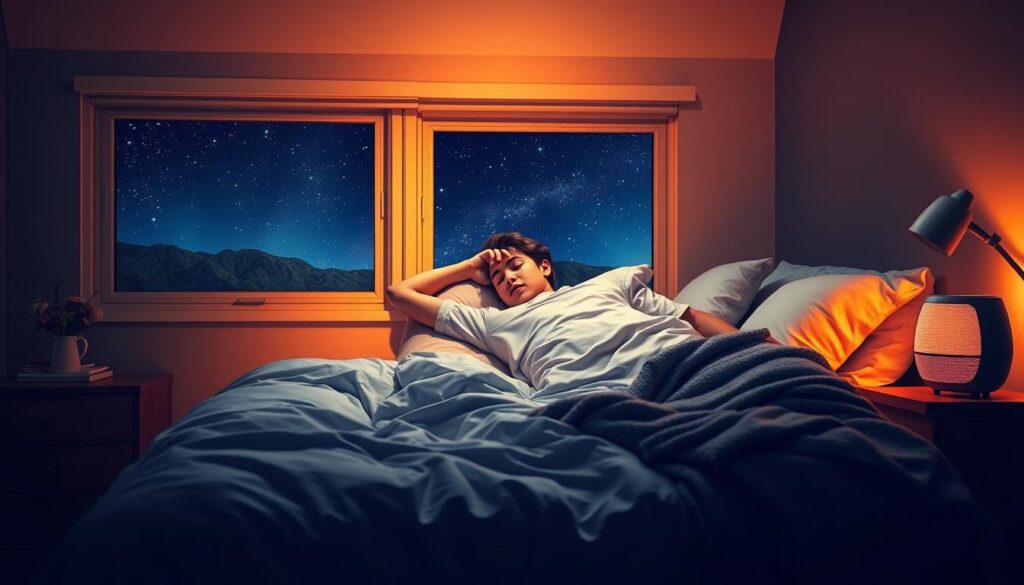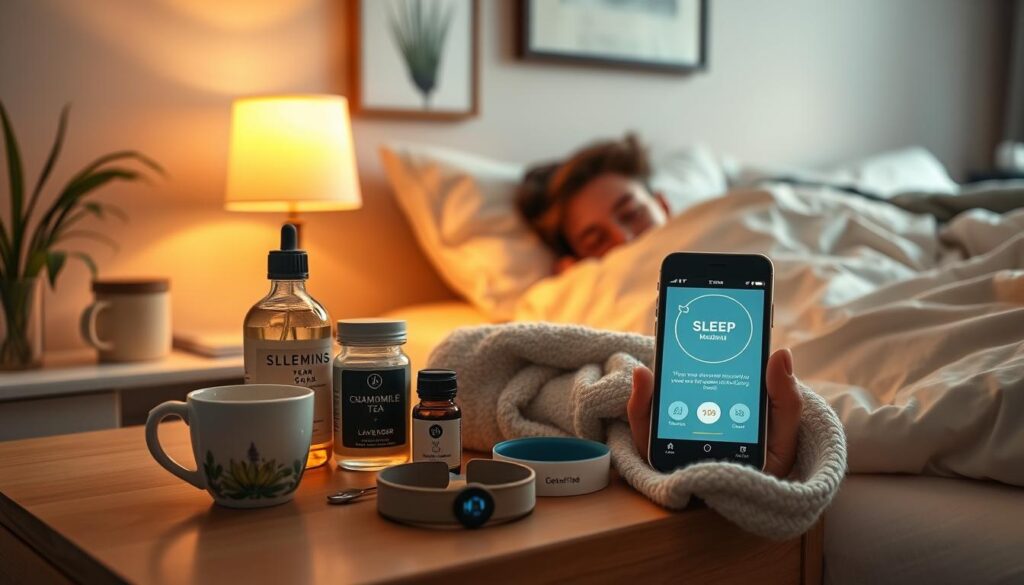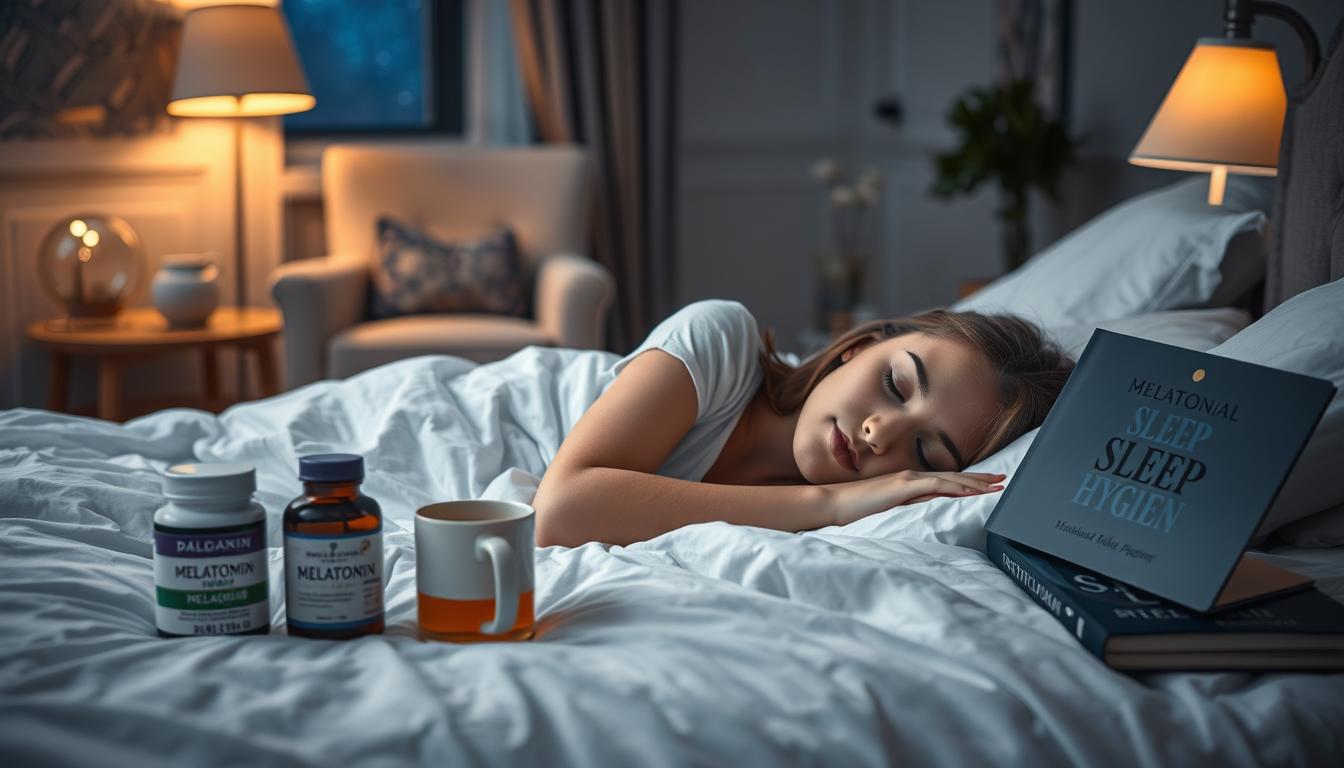Teens today face unique sleep struggles, from homework stress to screen time overload. Poor sleep affects grades, moods, and health. This guide explores the best sleep aids for teenagers and practical solutions to help them rest better.
Discover why quality sleep matters most during adolescence. Learn about safe options like melatonin, lifestyle tweaks, and expert-backed strategies to improve sleep habits.
Key Takeaways
- Teen sleep patterns are shaped by biology and modern challenges.
- Best sleep aids for teenagers include both products and routines.
- Technology use and school pressures disrupt teen sleep cycles.
- Simple changes like bedtime routines can make a big difference.
- Consulting doctors ensures safe use of sleep aids and supplements.
Understanding Teen Sleep Challenges
Adolescence brings big changes that disrupt sleep. Biological shifts and daily habits combine to create unique obstacles. Providing effective sleep support for youth starts with recognizing these factors.
Physical and Emotional Changes
- Puberty triggers shifts in circadian rhythms, making teens stay up late and struggle to wake early.
- Rising stress from school, friendships, or family strains mental well-being, reducing sleep quality.
- Melatonin release shifts, delaying natural sleep times by 2+ hours compared to adults.
Impact of Lifestyle on Sleep
Modern habits worsen sleep struggles. Teens exposed to screens late at night face:
- Blue light blocking melatonin production.
- Caffeine in sodas or energy drinks disrupting sleep cycles.
- Social media use creating anxiety before bed.
“Teens using screens past 10 PM sleep 1 hour less nightly,” says the National Sleep Foundation.
Addressing these challenges helps teens rebuild healthy sleep routines. Small adjustments can lead to lasting sleep support for youth, improving focus and mood.
Importance of Sleep for Adolescent Health
Sleep fuels teens’ brains and bodies during their most critical growth years. For adolescents, 8–10 hours of quality rest daily isn’t a luxury—it’s essential. Without enough sleep, grades, moods, and physical health suffer. That’s where teen-friendly sleep aids come in, offering support when natural cycles fall short.
- Cognitive Function: Sleep strengthens memory and focus, helping teens tackle schoolwork and complex tasks.
- Emotional Health: Rest regulates emotions, reducing irritability and boosting resilience against stress.
- Physical Growth: Deep sleep releases growth hormones, crucial for muscle development and overall health.
| Health Area | Why It Matters |
|---|---|
| Cognitive | Sharpens learning and problem-solving skills |
| Emotional | Reduces anxiety and mood swings |
| Physical | Promotes healthy development and immunity |
When sleep struggles arise, teen-friendly sleep aids can bridge gaps. Prioritizing rest isn’t just about feeling rested—it’s about building a foundation for lifelong health. Next sections explore how to choose safe and effective solutions.
Exploring Best sleep aids for teenagers
Choosing the right sleep aids requires balancing safety and effectiveness. Teens and parents should research recommended sleep aids for teenagers to address sleep issues without risking health. Always prioritize consulting a healthcare provider before use.
Over-the-Counter Options
Common OTC choices include:
- Melatonin supplements (e.g., Nature’s Bounty or Now Foods) to regulate sleep cycles
- Antihistamines like Benadryl, though drowsiness may vary
- Herbal remedies such as valerian root (Thorne Research) for mild relaxation
Always read labels and start with the lowest dose to avoid side effects like drowsiness or dependency risks.
Prescription Considerations
Doctors may prescribe medications only when sleep issues stem from conditions like anxiety or depression. Examples include:
- Benzodiazepines (e.g., Xanax) for short-term anxiety-related insomnia
- SSRIs like Prozac for underlying mental health conditions
Prescription drugs require strict medical supervision due to potential side effects. Never self-prescribe; follow professional guidance.
Discuss all options with a healthcare provider to ensure choices align with individual needs and health history.
Natural Sleep Remedies for Teens
Natural sleep remedies for teens offer safe, drug-free ways to improve rest. Mindfulness practices like deep breathing or guided imagery help calm racing thoughts. Physical activity during the day, like walking or yoga, tires the body and signals tiredness. Try these simple strategies:
- Consistent bedtime routines: Reading or journaling instead of screens
- Dim lighting: Soft lamps instead of bright overhead lights
- Warm baths: Raise body temperature before cooling down to induce sleepiness
| Technique | How It Works |
|---|---|
| Meditation apps | Guided sessions reduce anxiety |
| White noise machines | Block disruptive sounds |
| Herbal teas | Chamomile or valerian root options |
“Consistent relaxation rituals help reset the body’s internal clock,” says Dr. Lisa Klein, pediatric sleep specialist. “Even 10 minutes of deep breathing nightly can make a difference.”
Tracking sleep patterns with apps like Sleep Cycle helps identify trends. Encourage teens to avoid caffeine after noon and reserve bedrooms for sleep only. These steps build healthy habits without relying on medications.
Top Sleep Supplements for Adolescents
When exploring options to support better sleep, supplements can offer targeted help for teens struggling with sleep disruptions. Parents often seek safe and effective solutions, and research shows certain supplements may address common issues like irregular sleep cycles or stress.
Melatonin Benefits
Melatonin, a hormone that regulates sleep-wake cycles, is a popular choice. Studies suggest doses between 0.5–3 mg taken 1–2 hours before bed can improve falling asleep faster. Look for brands like Nature’s Bounty or Now Foods, which offer formulations designed for younger users. Always start with the lowest effective dose and consult a pediatrician first.
Alternative Supplements
Other options include:
- Magnesium glycinate: Supports relaxation without stomach upset (try Thorne Research).
- L-theanine: Found in green tea extracts, it promotes calmness without drowsiness.
- Vitamin B6: Helps the body produce melatonin naturally.
“Supplements work best when paired with consistent sleep routines,” says Dr. Sarah Lee, a pediatric sleep specialist. “They’re a tool, not a cure-all.”
Always prioritize consulting healthcare providers before starting any supplement. Quality matters—opt for brands with third-party lab testing. Prioritizing safety ensures these top sleep supplements for adolescents become part of a holistic plan for better rest.
Herbal Sleep Remedies for Adolescents
When looking for natural ways to help teens sleep, herbal options offer a gentle approach. Many herbs promote relaxation without harsh side effects, making them a popular choice for families seeking alternatives to supplements or medications.
Chamomile and Lavender
Chamomile tea and lavender essential oils are two trusted herbs for calming the mind. Chamomile contains apigenin, a compound that reduces anxiety. Lavender’s scent interacts with brain receptors to lower heart rate and stress hormones. Both are easy to incorporate into nightly routines.
Usage and Dosage Tips
Here’s how to use these herbs safely and effectively:
- Drink caffeine-free chamomile tea 30 minutes before bed.
- Add a few drops of lavender oil to a diffuser or pillow spray.
- Stick to recommended doses—no more than 1–2 cups of tea or 2% essential oil dilution.
Always consult a doctor before mixing herbs with existing medications. Consistency is key—try these remedies nightly for best results.
Lifestyle Changes to Improve Teen Sleep
Effective sleep solutions for high schoolers often start with small, consistent habits. Teens can boost sleep quality by prioritizing daily routines that align with their natural body clocks. For example, exercising regularly—but not too close to bedtime—helps tire the body in a healthy way. Avoiding caffeine after noon and keeping screens out of the bedroom also make a big difference.
- Stick to a sleep schedule: Go to bed and wake up at the same time, even on weekends.
- Create a wind-down ritual: Try reading or gentle stretching before bed to signal the brain it’s time to rest.
- Limit screen time 1–2 hours before bed: Blue light from phones and tablets disrupts melatonin production.
“Consistency is key. Teens who follow a nightly routine fall asleep faster and sleep longer,” says the National Sleep Foundation.
Even small changes add up. Keeping bedrooms cool, dark, and quiet improves sleep quality. Parents can support teens by encouraging homework and screen-free zones after 9 PM. Mindfulness apps like Calm or Headspace offer guided breathing exercises to calm busy minds. Prioritizing these steps helps teens feel more rested and ready to tackle school days.
Effective Sleep Solutions for High Schoolers
Maintaining consistent sleep routines and adjusting sleep environments can dramatically improve high schoolers’ rest. Small changes make a big difference—like sticking to fixed bedtimes or using sleep-enhancing products for young adults that reduce distractions.
Consistent Sleep Schedules
- Set the same bedtime and wake-up time, even on weekends.
- Avoid late-night screen time to keep circadian rhythms steady.
- Use alarms to signal “wind-down” time, like 30 minutes before bed.
Environment Adjustments
A bedroom’s setup directly affects sleep quality. Try these tips:
| Issue | Solution | Product Example |
|---|---|---|
| Light pollution | Block external light | Blackout curtains |
| Noise disruptions | Add calming background sound | White noise machines |
| Bed comfort | Improve mattress/ pillow support | Ergonomic foam pillows |
Pairing these adjustments with tools like weighted blankets or dimmable lights boosts results. Prioritizing sleep consistency and smart environment tweaks empowers teens to take charge of their rest.
Teenage Insomnia Remedies
Teens struggling with insomnia might feel exhausted during the day or find it hard to fall asleep at night. Stress, homework, and screen time often play a role. Here are proven teenage insomnia remedies to try:

- Set a bedtime routine. Go to bed and wake up at the same time daily, even on weekends.
- Limit screens 1–2 hours before bed. Blue light from phones or tablets disrupts sleep hormones.
- Try relaxation techniques like deep breathing or journaling to calm the mind.
- Keep the bedroom cool, dark, and quiet. A comfortable mattress and pillows matter too.
- Talk to a counselor or doctor if anxiety or stress feels overwhelming.
A consistent routine helps reset the body’s natural clock. If insomnia lasts more than a few weeks, consulting a healthcare provider ensures there’s no underlying issue. Small changes like avoiding caffeine after noon can make a big difference.
“Insomnia isn’t just about missing sleep—it’s a signal to address deeper habits,” says Dr. Emily Carter, a pediatric sleep specialist.
Combining these steps with earlier tips on diet and exercise from earlier sections can create a full plan. Prioritizing sleep hygiene builds habits for lifelong health. Start small and track progress with a sleep diary to see what works best.
Creating a Relaxing Sleep Environment for Youth
A peaceful bedroom setup and less screen time can help teens sleep better. Here’s how to design a space that promotes restful nights.
Bedroom Setup Tips
- Choose a supportive mattress. Brands like Casper or Tempur-Pedic offer options for comfort.
- Keep the room cool—around 65°F (18°C)—to improve sleep quality.
- Use blackout curtains to block light, helping regulate natural sleep cycles.
- Add a white noise machine like the Marpac Dohm to mask disruptive sounds.
Technology Curfews
Devices emit blue light that disrupts sleep. Try these steps:
- Set a tech curfew 1–2 hours before bed to let the brain wind down.
- Use apps like Screen Time (iOS) or Digital Wellbeing (Android) to track and limit screen use.
- Replace screen time with reading, drawing, or journaling to relax.
Experts at the American Academy of Pediatrics recommend avoiding screens before bed to boost sleep quality. Small changes in the bedroom and tech habits can make a big difference!
Sleep Support for Youth: Diet and Exercise
Healthy eating and regular movement can improve sleep for teens. Small changes in diet and daily activity make a big difference. Let’s explore how to use food and exercise to boost rest.
Foods That Promote Sleep
Eating the right foods helps calm the body. Try these options:
- Almonds or walnuts: High in magnesium and melatonin.
- Bananas: Natural potassium and vitamin B6 to relax muscles.
- Warm milk: Contains tryptophan, which boosts sleep hormones.
- Avoid caffeine after noon: Sodas, energy drinks, or chocolate close to bedtime.
Physical Activity for Better Rest
Moving more during the day leads to deeper sleep. Tips to try:
- Exercise 3-4 times weekly, like running, swimming, or yoga.
- Avoid intense workouts 2-3 hours before bed to stay calm.
- Walking or stretching in the morning resets the body’s sleep cycle.
Small steps like these build a routine that supports rest. Pair these tips with other sleep aids for teenagers for best results.
Top Sleep-Enhancing Products for Young Adults
When seeking better sleep, choosing the right tools can make a big difference. Modern products designed for sleep focus on comfort, noise control, and tech-driven solutions. Here’s what works:
- Smart sleep trackers like the Withings Sleep Analyzer monitor breathing and movement to improve sleep habits.
- White noise machines such as the LectroFan help block disruptive sounds with customizable calming sounds.
- Pressure-relieving mattresses from brands like Casper offer ergonomic support for growing bodies.

Light-blocking eye masks or scented sleep sprays like lavender formulas can also create a restful vibe. Tech fans might enjoy apps like Calm, which combine guided meditations with sleep sounds.
Pro tip: Pair these tools with consistent bedtime routines. Start by testing one product at a time to see what helps most. Always check reviews and pick items with safety certifications.
Choosing Teen-Friendly Sleep Aids
Picking the right sleep aids for teens needs careful thought. Safety and expert advice are key to helping them rest better without risks.
Safety Considerations
Always check product labels for ingredients like melatonin or herbal extracts. Avoid stimulants such as caffeine in the evening. Look for brands like Nature’s Aid or Now Foods that follow safety standards.
- Read reviews and warnings on packaging.
- Stick to recommended dosages for teens’ age ranges.
- Stay away from untested or unregulated supplements.
Consulting Healthcare Professionals
Doctors can suggest safe options tailored to your teen’s needs. They’ll check for allergies or health conditions that affect sleep aid choices. A pediatrician can also rule out underlying issues like anxiety or sleep disorders.
- Discuss all current medications to avoid interactions.
- Ask about non-drug solutions like sleep schedules or therapy.
- Follow their advice on how long to use products.
Never start a sleep aid routine without professional guidance. Your teen’s health comes first.
Conclusion
Supporting better sleep for teens requires balancing proven strategies and thoughtful choices. Melatonin supplements, calming herbs like chamomile, and consistent sleep schedules create a strong foundation. Simple changes like dimming lights before bed or limiting screen time boost sleep quality. If needed, consulting a healthcare provider ensures safe use of sleep aids. Prioritizing a cool, dark bedroom and avoiding caffeine close to bedtime makes a noticeable difference. Small steps like these help teens feel more rested and ready to tackle daily challenges. Combining these tips with mindful habits builds long-term sleep health. Start with one adjustment, like winding down with a book instead of phones, and gradually add others. Every effort toward better sleep today sets the stage for brighter, more energized tomorrows.
FAQ
What are the best sleep aids for teenagers?
The best sleep aids for teenagers often include over-the-counter options like melatonin and natural sleep remedies such as herbal teas containing chamomile or lavender. It’s important to choose products that are safe and suitable for young individuals.
How can lifestyle changes improve my teen’s sleep?
Encouraging consistent sleep schedules, reducing screen time before bed, and promoting relaxation techniques can greatly enhance your teen’s sleep quality. Healthy diet and exercise also play a significant role in supporting better rest.
What are some effective sleep solutions for high schoolers?
Effective solutions include establishing a calming bedtime routine, optimizing the sleep environment by reducing noise and light, and using sleep-enhancing products like white noise machines or comfy bedding.
Are there any natural sleep remedies for teens?
Yes! Natural remedies like mindfulness meditation, relaxation exercises, and herbal sleep remedies such as valerian root and chamomile can effectively promote restful sleep for teens.
What supplements are recommended for adolescent sleep?
Melatonin is a commonly recommended supplement for adolescents, but other options like magnesium and certain B vitamins can also support sleep. Always consult with a healthcare professional before starting any new supplements.
How do we address teenage insomnia?
Tackling teenage insomnia involves identifying underlying causes, practicing good sleep hygiene, and possibly exploring sleep aids or therapies. Keeping a sleep diary can also help track patterns and pinpoint issues.
What should teens know about using sleep aids safely?
It’s crucial for teens to consult healthcare professionals before using any sleep aids. They should be aware of potential side effects and ensure they are using products specifically formulated for their age group.
Can diet affect my teen’s sleep?
Absolutely! Foods rich in magnesium and tryptophan, such as bananas, nuts, and dairy, can promote better sleep. Avoiding caffeine and large meals close to bedtime is also important.
How can parents help their teens create a relaxing sleep environment?
Parents can help by ensuring the bedroom is dark, quiet, and cool. Incorporating comfortable bedding, minimizing distractions, and setting technology curfews can further enhance the sleep environment.
What are some teen-friendly sleep aids?
Teen-friendly sleep aids include non-prescription options like melatonin, herbal teas, and aromatherapy products. It’s important to choose safe options specifically designed for younger audiences.
